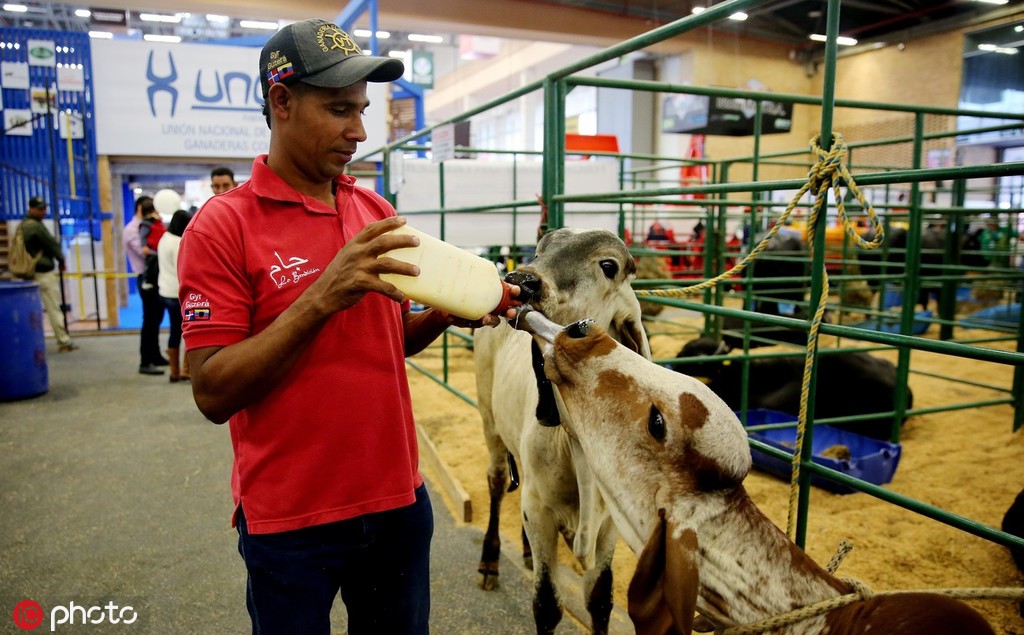Colombia beef, pork producers optimistic on exports to China

A man feeds the cattle displayed at the Agroexpo fair in Bogota, Colombia, July 13, 2017. [Photo/IC]
Colombia beef, pork producers optimistic on exports to China
By Sergio Held | China Daily | Updated: 2019-08-08 09:36
Colombia’s cattle and pork breeders are cautiously optimistic they will soon be able to export their products to China to take advantage of rising pork prices following Colombian President Ivan Duque Marquez’s state visit to Beijing in late July.
“This (Duque’s visit) was a significant step that I believe will open a lot of trade,” Jose Felix Lafaurie, president of Fedegan, the Colombian National Federation of Cattle Ranchers, told China Daily.
Lafaurie was part of the delegation that visited China from July 28 to 31.
Global pork prices have been rising since an outbreak of African swine fever in parts of China last year. This could translate into opportunities for Colombian cattle ranchers and pig growers, said Lafaurie.
He expects China will increase its imports of beef to 3 million metric tons from 1 million tons.
“I have no doubt that if the Chinese market is opened for us, it can bring an important dynamic to the livestock sector. It can be transformational, especially for the Caribbean coast, which would clearly be one of the regions that would aim to provide meat for the Chinese market.”
Chinese consumers are also starting to try alternative sources of protein, both to keep the balance on their diets and to curb costs.
Colombian cattle breeders have been kept out of the Chinese market while they wait for the World Organization for Animal Health to certify Colombia as being free of the foot and mouth disease.
Colombia lost that status in October 2018 after an outbreak in its central region. The situation has been contained, and Colombian authorities expect the country to be recertified over the next month.
“If we quickly achieve during the next year the opening of that (beef) market, we will transform the agricultural sector of Colombia,” said President Duque during a Colombia-China Economic and Trade Forum in Beijing on July 31.
While the beef sector is optimistic, the pork sector is more cautious. China is not yet allowing imports of Colombian pork products, and it is unclear when they will get the green light.
“The dates to enable the exports of pork from Colombia are still uncertain, and the processes must be fulfilled,” Jeffrey Fajardo, executive president of PorkColombia, the pig farming industry organization in the country, told China Daily.
“We hope that the protocol will be defined this year, and that the authorization of the production plants will not go beyond the first semester of 2020,” Fajardo said.
Colombia produced about 410,000 tons of pork last year, contributing to about 1.4 percent of the country’s agricultural GDP, Colombian government data showed.
The United States Department of Agriculture estimated that 56.5 million tons of pork are consumed in China every year.
Colombian pork producers understand the potential of the Chinese pork market but do not want to rely on external factors like the outbreak of African swine fever to gain market share.
“The current market issues will have to be analyzed once we have access (to the Chinese market),” said Fajardo of PorkColombia.
His caution may be related to the tough sanitary barriers that the Chinese government has set for pork imports.
China has strict inspection and quarantine policies on pork imports. As of November 2018, only 16 countries or regions such as the US, Canada, Brazil, Chile and Mexico were allowed to export pork products to China.
For PorkColombia, Duque’s state visit to China marks the beginning of high-level economic diplomacy between the two nations.
“It should lead to the approval, in the upcoming months, of the health protocol between the authorities of both countries,” PorkColombia said in a news release.
Cattle breeders and pork producers have undertaken exploratory visits to China to learn more about the market and strengthen relationships with their counterparts.
Jaime Suarez, executive director of the Colombian-Chinese Chamber of Investment and Trade, noted that pig and cattle ranchers’ guilds were part of the delegation in the recent state visit, together with the minister of agriculture and the president of the Society of Farmers of Colombia.
“The presence of the agricultural sector in the mission demonstrates the interest of having a much stronger presence of Colombian products in the Chinese market,” Suarez said.
The author is a contributing journalist for China Daily.
